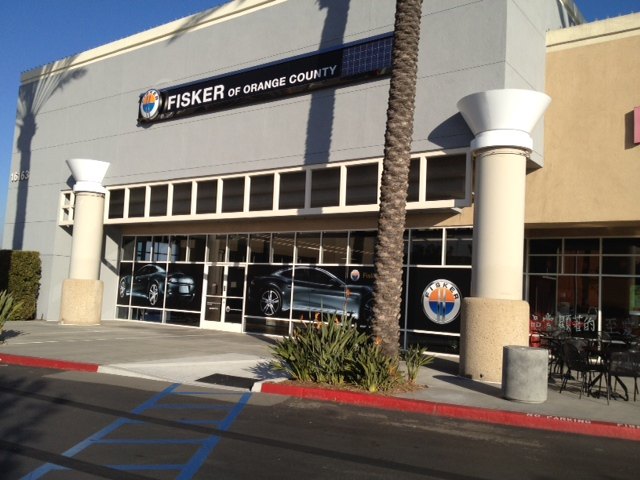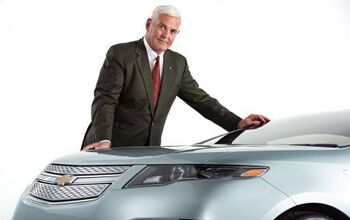Fisker Will Be Chinese, One Way Or The Other

Not Dongfeng, but China’s Geely currently looks best positioned to profit from U.S. government largesse by buying beleaguered and DOE- funded plug-in car maker Fisker, Reuters reports. According to the report, “Zhejiang Geely Holding Group is favored to secure a majority stake in troubled U.S. electric car maker Fisker Automotive, according to two sources familiar with Fisker’s search for a strategic investor or partner.”
Also according to the report, red flags are sure to flutter over Fisker’s HQ in Anaheim, as Fisker “is currently weighing bids from two Chinese auto makers: Geely, the owner of Sweden’s Volvo, and state-owned Dongfeng Motor Group Co.”
Geely Chairman Liu Shu Fu (left)
Geely and Dongfeng did offer between $200 million to $300 million for a controlling interest in Fisker. Reuters’ sources think Geely has the inside track, because Geely is “more serious” and “passionate” about Fisker and its technology, the company also is said to be able to “move fast in making decisions — unlike Dongfeng, whose responsiveness could be hampered by its multi-layered decision-making structure typical in a Chinese state-owned enterprise.”
In 2009, Fisker received a $528.7 million conditional loan from the DOE. After drawing down $193 million, the credit line was frozen, following a series of scandals surrounding other DOE recipients. Production was shut down in summer of 2012 while fresh capital was sought. The financial troubles of Fisker’s battery supplier A123 gave Fisker another reason not to restart production. A123, another recipient of DOE largesse, was sold off to China.
Which is where DOE recipients appear to get outsourced to.

Bertel Schmitt comes back to journalism after taking a 35 year break in advertising and marketing. He ran and owned advertising agencies in Duesseldorf, Germany, and New York City. Volkswagen A.G. was Bertel's most important corporate account. Schmitt's advertising and marketing career touched many corners of the industry with a special focus on automotive products and services. Since 2004, he lives in Japan and China with his wife <a href="http://www.tomokoandbertel.com"> Tomoko </a>. Bertel Schmitt is a founding board member of the <a href="http://www.offshoresuperseries.com"> Offshore Super Series </a>, an American offshore powerboat racing organization. He is co-owner of the racing team Typhoon.
More by Bertel Schmitt
Latest Car Reviews
Read moreLatest Product Reviews
Read moreRecent Comments
- Honda1 Unions were needed back in the early days, not needed know. There are plenty of rules and regulations and government agencies that keep companies in line. It's just a money grad and nothing more. Fain is a punk!
- 1995 SC If the necessary number of employees vote to unionize then yes, they should be unionized. That's how it works.
- Sobhuza Trooper That Dave Thomas fella sounds like the kind of twit who is oh-so-quick to tell us how easy and fun the bus is for any and all of your personal transportation needs. The time to get to and from the bus stop is never a concern. The time waiting for the bus is never a concern. The time waiting for a connection (if there is one) is never a concern. The weather is never a concern. Whatever you might be carrying or intend to purchase is never a concern. Nope, Boo Cars! Yeah Buses! Buses rule!Needless to say, these twits don't actual take the damn bus.
- MaintenanceCosts Nobody here seems to acknowledge that there are multiple use cases for cars.Some people spend all their time driving all over the country and need every mile and minute of time savings. ICE cars are better for them right now.Some people only drive locally and fly when they travel. For them, there's probably a range number that works, and they don't really need more. For the uses for which we use our EV, that would be around 150 miles. The other thing about a low range requirement is it can make 120V charging viable. If you don't drive more than an average of about 40 miles/day, you can probably get enough electrons through a wall outlet. We spent over two years charging our Bolt only through 120V, while our house was getting rebuilt, and never had an issue.Those are extremes. There are all sorts of use cases in between, which probably represent the majority of drivers. For some users, what's needed is more range. But I think for most users, what's needed is better charging. Retrofit apartment garages like Tim's with 240V outlets at every spot. Install more L3 chargers in supermarket parking lots and alongside gas stations. Make chargers that work like Tesla Superchargers as ubiquitous as gas stations, and EV charging will not be an issue for most users.
- MaintenanceCosts I don't have an opinion on whether any one plant unionizing is the right answer, but the employees sure need to have the right to organize. Unions or the credible threat of unionization are the only thing, history has proven, that can keep employers honest. Without it, we've seen over and over, the employers have complete power over the workers and feel free to exploit the workers however they see fit. (And don't tell me "oh, the workers can just leave" - in an oligopolistic industry, working conditions quickly converge, and there's not another employer right around the corner.)
































Comments
Join the conversation
What 'technology' in Fisker's Volt Fastback Edition is worth buying? I've seen maybe six in six months, one of which was on a flatbed. In car world, nothing is sillier than an expensive, sleek Viagramobile that's built cheap and goes slow. Pathetic.
little bit off-topic, but here is a great article about car batteries: http://www.anandtech.com/show/6759/tesla-model-s-effects-of-temperature-on-ev-efficiency-and-range